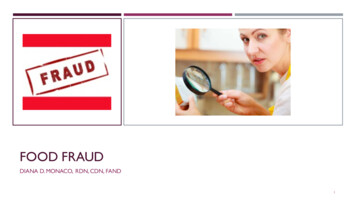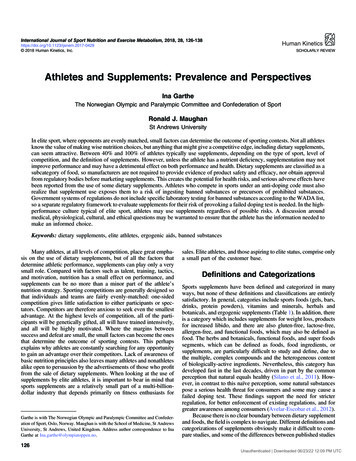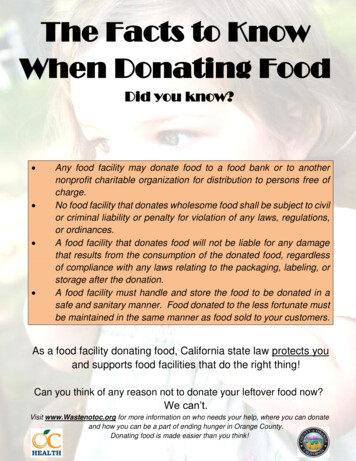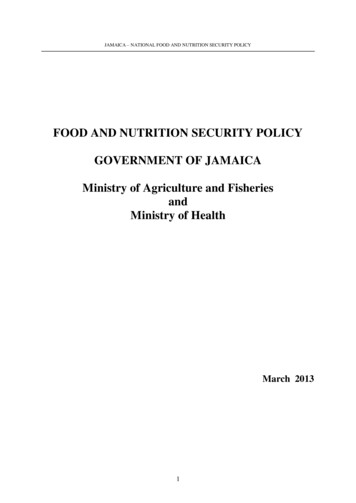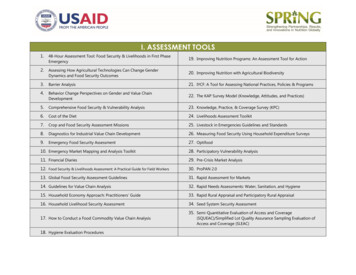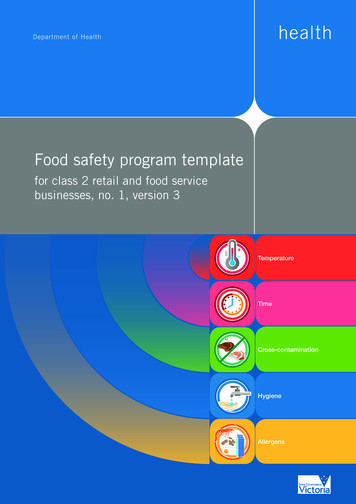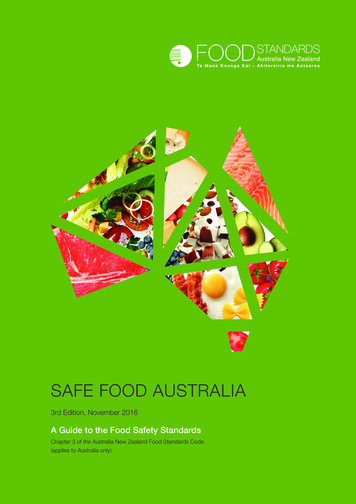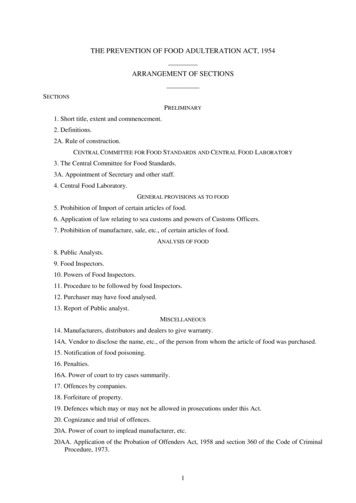
Transcription
THE PREVENTION OF FOOD ADULTERATION ACT, 1954ARRANGEMENT OF SECTIONSSECTIONSPRELIMINARY1. Short title, extent and commencement.2. Definitions.2A. Rule of construction.CENTRAL COMMITTEE FOR FOOD STANDARDS AND CENTRAL FOOD LABORATORY3. The Central Committee for Food Standards.3A. Appointment of Secretary and other staff.4. Central Food Laboratory.GENERAL PROVISIONS AS TO FOOD5. Prohibition of Import of certain articles of food.6. Application of law relating to sea customs and powers of Customs Officers.7. Prohibition of manufacture, sale, etc., of certain articles of food.ANALYSIS OF FOOD8. Public Analysts.9. Food Inspectors.10. Powers of Food Inspectors.11. Procedure to be followed by food Inspectors.12. Purchaser may have food analysed.13. Report of Public analyst.MISCELLANEOUS14. Manufacturers, distributors and dealers to give warranty.14A. Vendor to disclose the name, etc., of the person from whom the article of food was purchased.15. Notification of food poisoning.16. Penalties.16A. Power of court to try cases summarily.17. Offences by companies.18. Forfeiture of property.19. Defences which may or may not be allowed in prosecutions under this Act.20. Cognizance and trial of offences.20A. Power of court to implead manufacturer, etc.20AA. Application of the Probation of Offenders Act, 1958 and section 360 of the Code of CriminalProcedure, 1973.1
SECTIONS21. Magistrate’s power to impose enhanced penalties.22. protection of action taken in good faith.22A. Power of Central Government to give directions.23. Powder of Central Government to make rules.24. Power of the State Government to make rules.25. Repeal and Saving.2
THE PREVENTION OF FOOD ADULTERATION ACT, 1954ACT NO. 37 OF 1954[29th September, 1954.]An Act to make provision for the prevention of adulteration of food.BE it enacted by Parliament in the Fifth Year of the Republic of India as follows:—PRELIMINARY1. Short title, extent and commencement.—(1) This Act may be called the Prevention of FoodAdulteration Act, 1954.(2) It extends to the whole of India 1***.(3) It shall come into force on such date2 as the Central Government may, by notification in theOfficial Gazette, appoint.2. Definitions.—In this Act, unless the context otherwise requires,—[(i) “adulterant” means any material which is or could be employed for the purposes ofadulteration;]3[(ia)] “adulterated”—an article of food shall be deemed to be adulterated—4(a) if the article sold by a vendor is not of the nature, substance or quality demanded by thepurchaser and is to his prejudice, or is not of the nature, substance or quality which it purports oris represented to be;(b) if the article contains any other substance which affects, or if the article is so processed asto affect, injuriously the nature, substance or quality thereof;(c) if any inferior or cheaper substance has been substituted wholly or in part for the article soas to affect injuriously the nature, substance or quality thereof;(d) if any constituent of the article has been wholly or in part abstracted so as to affectinjuriously the nature, substance or quality thereof;(e) if the article had been prepared, packed or kept under insanitary conditions whereby it hasbecome contaminated or injurious to health;(f) if the article consists wholly or in part of any filthy, putrid, 5*** rotten, decomposed ordiseased animal or vegetable substance or is insect-infested or is otherwise unfit for humanconsumption;(g) if the article is obtained from a diseased animal;(h) if the article contains any poisonous or other ingredient which renders it injurious tohealth;(i) if the container of the article is composed, whether wholly or in part, of any poisonous ordeleterious substance which renders its contents injurious to health;1. The words “except the State of Jammu and Kashmir” omitted by Act 41 of 1971, s. 2 (w.e.f. 26-1-1972).2. 1st June, 1955, vide notification No. S.R.O. 1085 (E), dated 9th May, 1955, see Gazette of India, Extraordinary, Part II,sec. 3(i).This Act has been extended to Dadra and Nagar Haveli by Reg. 6 of 1963, s. 2 and Sch. I, to Pondicherry by Reg. 7 of1963, s. 3 and Sch. I, to Goa, Daman and Diu by Reg. 11 of 1963, s. 3 and Sch. and to Kohima and Mokokchun district inNagaland by Act 24 of 1972, s. 2 (w.e.f. 1-4-1973).3. Ins. by Act 34 of 1976, s. 2 (w.e.f. 1-4-1976).4. Clause (i) re-numbered as clause (ia), thereof by s. 2, ibid. (w.e.f. 1-4-1976).5. The word “disgusting,” omitted by s. 2, ibid. (w.e.f. 1-4-1976).3
1[(j) if any colouring matter other than that prescribed in respect thereof is present in thearticle, or if the amounts of the prescribed colouring matter which is present in the article are notwithin the prescribed limits of variability;](k) if the article contains any prohibited preservative or permitted preservative in excess ofthe prescribed limits;2[(l) if the quality or purity of the article falls below the prescribed standards or itsconstituents are present in quantities not within the prescribed limits of variability, which rendersit injurious to health;(m) If the quality or purity of the article falls below the prescribed standards or itsconstituents are present in quantities not within the prescribed limits of variability but which doesnot render it injurious to health.Provided that, where the quality or purity of the article, being primary food, has fallen belowthe prescribed standards or its constituents are present in quantities not within the prescribedlimits of variability, in either case, solely due to natural causes and beyond the control of humanagency, then, such article shall not be deemed to be adulterated within the meaning of thissub-clause.Explanation.—Where two or more articles of primary food are mixed together and theresultant article of food—(a) is stored, sold or distributed under a name which denotes the ingredients thereof; and(b) is not injurious to health.then, such resultant article shall not be deemed to be adulterated within the meaning of this clause;](ii) “Central Food Laboratory” means any laboratory or institute established or specified undersection 4;(iii) “Committee” means the Central Committee for Food Standards constituted under section 3;(iv) “Director of the Central Food Laboratory” means the person appointed by the CentralGovernment by notification in the Official Gazette as the Director of the Central Food Laboratory andincludes any person appointed by the Central Government in like manner to perform all or any of thefunctions of the Director under this Act;3[Provided that no person who has any financial interest in the manufacture, import or sale of anyarticle of food shall be appointed to be a Director under this clause;][(v) “food” means any article used as food or drink for human consumption other than drug andwater and includes—4(a) any article which ordinarily enters into, or is used in the composition or preparation of,human food,(b) any flavouring matter or condiments, and(c) any other article which the Central Government may, having regard to its use, nature,substance or quality, declare by notification in the Official Gazette, as food for the purposes ofthis Act;]1. Subs. by Act 34 of 1976, s. 2, for sub-clause (j) (w.e.f. 1-4-1976).2. Subs. by s. 2, ibid., for sub-clause (l) (w.e.f. 1-4-1976).3. Ins. by s. 2, ibid. (w.e.f. 1-4-1976).4. Subs. by s. 2, ibid., for clause (v) (w.e.f. 1-4-1976).4
[(vi) “Food (Health) Authority” means the Director of Medical and Health Services or the ChiefOfficer in charge of Health administration in a State, by whatever designation he is known, andincludes any officer empowered by the Central Government or the State Government, by notificationin the Official Gazette, to exercise the powers and perform the duties of the Food (Health) Authorityunder this Act with respect to such local area as may be specified in the notification;]1(vii) “local area” means any area, whether urban or rural, declared by 2[the Central Governmentor the State Government] by notification in the Official Gazette, to be a local area for the purposes ofthis Act;(viii) “local authority” means in the case of:—(1) a local area which is—(a) a municipality, the municipal board or municipal corporation;(b) a cantonment, the cantonment authority;(c) a notified area, the notified area committee;(2) any other local area, such authority as may be prescribed by 2[the Central Government orthe State Government] under this Act;[(viiia) “Local (Health) Authority”, in relation to a local area, means the officer appointed by theCentral Government or the State Government, by notification in the Official Gazette, to be in chargeof Health administration in such area with such designation as may be specified therein;3(viiib) “manufacture” includes any process incidental or ancillary to the manufacture of an articleof food;](ix) “misbranded”—an article of food shall be deemed to be misbranded—(a) if it is an imitation of, or is a substitute for, or resembles in a manner likely to deceive,another article of food under the name of which it is sold, and is not plainly and conspicuouslylabelled so as to indicate its true character;(b) if it is falsely stated to be the product of any place or country;(c) if it is sold by a name which belongs to another article of food;(d) if it is so coloured, flavoured or coated, powdered or polished that the fact that the articleis damaged is concealed or if the articles is made to appear better or of greater value than it reallyis;(e) if false claims are made for it upon the label or otherwise;(f) if, when sold in packages which have been sealed or prepared by or at the instance of themanufacturer or producer and which bear his name and address, the contents of each package arenot conspicuously and correctly stated on the outside thereof within the limits of variabilityprescribed under this Act;(g) if the package containing it, or the label on the package bears any statement, design ordevice regarding the ingredients or the substances contained therein, which is false or misleadingin any material particular; or if the package is otherwise deceptive with respect to its contents;(h) if the package containing it or the label on the package bears the name of a fictitiousindividual or company as the manufacturer or producer of the article;(i) if it purports to be, or is represented as being, for special dietary uses, unless its label bearssuch information as may be prescribed concerning its vitamin, mineral, or other dietary propertiesin order sufficiently to inform its purchaser as to its value for such uses;1. Subs. by Act 34 of 1976, s. 2, for clause (vi) (w.e.f. 1-4-1976).2. Subs. by Act 49 of 1964, s. 2, for “the State Government” (w.e.f. 1-3-1965).3. Ins. by Act 34 of 1976, s. 2 (w.e.f. 1-4-1976).5
(j) if it contains any artificial flavouring, artificial colouring or chemical preservative, withouta declaratory label stating that fact, or in contravention of the requirements of this Act or rulesmade thereunder;(k) if it is not labelled in accordance with the requirements of this Act or rules madethereunder;(x) “package” means a box, bottle, gasket, tin, barrel, case, receptacle, sack bag, wrapper or otherthing in which an article of food is placed or packed;(xi) “premises” include any shop, stall, or place where any article of food is sold or manufacturedor stored for sale;(xii) “prescribed” means prescribed by rules made under this Act;[(xiia) “primary food” means any article of food, being a produce of agriculture or horticulture inits natural form;]1(xiii) “sale” with its grammatical variations and cognate expressions, means the sale of any articleof food, whether for cash or on credit or by way of exchange and whether by wholesale or retail, forhuman consumption or use, or for analysis, and includes an agreement for sale an offer for sale, theexposing for sale or having in possession for sale of any such article, and includes also an attempt tosell any such article;(xiv) “sample” means a sample of any article of food taken under the provisions of this Act or ofany rules made thereunder;(xv) the words “unwholesome” and “noxious” when used in relation to an article of food meanrespectively that the article is harmful to health or repugnant to human use.2[2A. Rule of construction.—Any reference in this act to a law which is not in force in the State ofJammu and Kashmir shall, in relation to that State, be construed as a reference to the corresponding law,if any, in force in that State.]CENTRAL COMMITTEE FOR FOOD STANDARDS AND CENTRAL FOOD LABORATORY3. The Central Committee for Food Standards.—(1) The Central Government shall, as soon asmay be after the commencement of this Act, constitute a Committee called the Central Committee forFood Standards to advise the Central Government and the State Governments on matters arising out ofthe administration of this Act and to carry out the other functions assigned to it under this Act.(2) The Committee shall consist of the following members, namely:—(a) the Director-General, Health Services, ex officio, who shall be the Chairman.3[(b) the Director of the Central Food Laboratory or, in a case where more than one Central FoodLaboratory is established, the Directors of such Laboratories, ex officio;](c) two experts nominated by the Central Government;4[(d) one representative each of the Departments of Food and Agriculture in the CentralMinistry of Food and Agriculture and one representative each of the Central Ministries of Commerce,Defence, Industry and Supply and Railways, nominated by the Central Government;](e) one representative each nominated by the Government of each 5*** State;(f) two representatives nominated by the Central Government to represent the 6[Union territories];1. Ins. by Act 34 of 1976, s. 2 (w.e.f. 1-4-1976).2. Ins. by Act 41 of 1971, s. 3 (w.e.f. 26-1-1972).3. Subs. by Act 34 of 1976, s. 3, for clause (b) (w.e.;f. 1-4-1976)4. Subs. by Act 49 of 1964, s. 3, for clause (d) (w.e.f. 1-3-1965).5. The words and letters “Part A State and Part B” omitted by A.O. (No. 3), 1956.6. Subs. by A.O. (No. 3), 1956, for “Part C States”.6
1[(g) one representative each, nominated by the Central Government, to represent the agricultural,commercial and industrial interests;(gg) five representatives nominated by the Central Government to represent the consumers’interests, one of whom shall be from the hotel industry;](h) one representative of the medical profession nominated by the Indian Council of MedicalResearch;2[(i) one representative nominated by the Indian Standards Institution referred to in clause (e) ofsection 2 of the Indian Standards Institution (Certification Marks) Act, 1952 (36 of 1952).](3) The members of the Committee referred to in clauses (c), (d), (e), (f), 3[4[(g), (gg),] (h) and (i)] ofsub-section (2) shall, unless their seats become vacant earlier by registration, death or otherwise, beentitled to hold office for three years and shall be eligible for re-nomination.(4) The functions of the Committee may be exercised notwithstanding any vacancy therein.(5) The Committee may appoint such and so many sub-committees as it deems fit and may appoint tothem persons who are not members of the Committee to exercise such powers and perform such duties asmay, subject to such conditions, if any, as the Committee may impose, be delegated to them by theCommittee.(6) The Committee may, subject to the previous approval of the Central Government, make bye-lawsfor the purpose of regulating its own procedure and the transaction of its business.5[3A. Appointment of Secretary and other staff.—(1) The Central Government shall appoint aSecretary to the Committee who shall, under the control and direction of the Committee, exercise suchpowers and perform such duties as may be prescribed or as may be delegated to him by the Committee.(2) The Central Government shall provide the Committee with such clerical and other staff as thatGovernment considers necessary.]4. Central Food Laboratory.—6[(1) The Central Government shall, by notification in the OfficialGazette, establish one or more Central Food Laboratory or Laboratories to carry out the functionsentrusted to the Central Food Laboratory by this Act or any rules made under this Act:Provided that the Central Government may by notification in the Official Gazette, also specify anylaboratory or institute as a Central Food Laboratory for the purposes of this Act.](2) The Central Government may, after consultation with the Committee, make rules prescribing—7[(a) the functions of a Central Food Laboratory and the local area or areas within which suchfunctions may be carried out;](b) the procedure for the submission to the said Laboratory of samples of articles of food foranalysis or tests, the forms of the Laboratory’s reports thereon and the fees payable in respect of suchreports;(c) such other matters as may be necessary or expedient to enable the said Laboratory to carry outits functions.GENERAL PROVISIONS AS TO FOOD5. Prohibition of Import of certain articles of food.—No person shall import into India—(a) any adulterated food;1. Subs. by Act 34 of 1976, s. 3, for clause (g) (w.e.f. 1-4-1976).2. Ins. by Act 49 of 1964, s. 3 (w.e.f. 1-3-1965).3. Subs. by s. 3, ibid., for “(g) and (h)” (w.e.f. 1-3-1965).4. Subs. by Act 34 of 1976, s. 3, for “(g),” (w.e.f. 1-4-1976).5. Ins. by s. 4, ibid. (w.e.f. 1-4-1976).6. Subs. by s. 5, ibid., for sub-section (1) (w.e.f. 1-4-1976).7. Subs. by s. 5, ibid., for clause (a) (w.e.f. 1-4-1976).7
(b) an misbranded food;(c) any article of food for the import of which a license is prescribed, except in accordance withthe conditions of the license; and(d) any article of food in contravention of any other provision of this Act or any rule madethereunder.6. Application of law relating to sea customs and powers of Customs Officers.—(1) The law forthe time being in force relating to sea customs and to goods, the import of which is prohibited by section18 of the Sea Customs Act, 1878 (8 of 1878) shall, subject to the provisions of section 16 of this Act,apply in respect of articles of food, the import of which is prohibited under section 5 of this Act, andofficers of Customs and officers empowered under that Act to perform the duties imposed thereby on a1[Commissioner of Customs] and other officers of Customs shall have the same powers in respect of sucharticles of food as they have for the time being in respect of such goods as aforesaid.(2) Without prejudice to the provisions of sub-section (1), the 1[Commissioner of Customs], or anyofficer of the Government authorised by the Central Government in this behalf, may detain any importedpackage which he suspects to contain any article of food the import of which is prohibited under section 5of this Act and shall forthwith report such detention to the Director of the Central Food Laboratory and if,required by him, forward the package or send samples of any suspected article of food found therein tothe said Laboratory.7. Prohibition of manufacture, sale, etc., of certain articles of food.—No person shall himself orby any person on his behalf manufacture for sale, or store, sell or distribute—(i) any adulterated food;(ii) any misbranded food;(iii) any article of food for the sale of which a licence is prescribed, except in accordance with theconditions of the licence;(iv) any article of food the sale of which is for the time being prohibited by the Food (Health)Authority 2[in the interest of public health; 3***](v) any article of food in contravention of any other provision of this Act or of any rule madethereunder; 4[or]4[(vi) any adulterant.]4[Explanation—For the purposes of this section, a person shall be deemed to store any adulteratedfood or misbranded food or any article of food referred to in clause (iii) or clause (iv) or clause (v) if hestores such food for the manufacture there from of any article of food for sale.]ANALYSIS OF FOOD5[8. Public Analysts.—The Central Government or the State Government may, by notification in theOfficial Gazette, appoint such persons as it thinks fit, having the prescribed qualifications to be publicanalysts for such local areas as may be assigned to them by the Central Government or the StateGovernment, as the case may be:Provided that no person who has any financial interest in the manufacture, import or sale of anyarticle of food shall be appointed to be a public analyst under this section:6[Provided further that different public analysts may be appointed for different articles of food.]1. Subs. by Act 22 of 1995, s. 87, for “Customs Collector” (w.e.f. 26-5-1995).2. Subs by Act 49 of 1964, s. 4, for “with a view to preventing the outbreak or spread of infectious diseases” (w.e.f. 1-3-1965).3. The word “or” omitted by Act 34 of 1976, s. 6 (w.e.f. 1-4-1976).4. Ins. by s. 6, ibid. (w.e.f. 1-4-1976).5. Subs. by Act 49 of 1964, s. 5, for sections 8 and 9 (w.e.f. 1-3-1965).6. Ins. by Act 34 of 1976, s. 7 (w.e.f. 1-4-1976).8
9. Food Inspectors.—(1) The Central Government or the State Government may, by notification inthe Official Gazette, appoint such person as it thinks fit, having the prescribed qualifications to be foodinspectors for such local areas as may be assigned to them by the Central Government or the StateGovernment, as the case may be:Provided that no person who has any financial interest in the manufacture, import or sale of anyarticle of food shall be appointed to be a food inspector under this section.(2) Every food inspector shall be deemed to be a public servant within the meaning of section 21 ofthe Indian Penal Code (45 of 1860) and shall be officially subordinate to such authority as theGovernment appointing him, may specify in this behalf.]10. Powers of Food Inspectors.—(1) A food Inspector shall have power—(a) to take samples of any article of food from—(i) any person selling such article;(ii) any person who is in the course of conveying, delivering or preparing to deliver sucharticle to a purchaser or consignee;(iii) a consignee after delivery of any such article to him; and(b) to send such sample for analysis to the public analyst for the local area within which suchsample has been taken;1[(c) with the previous approval of the Local (Health) Authority having jurisdiction in the localarea concerned, or with the previous approval of the Food (Health) Authority, to prohibit the sale ofany article of food in the interest of public health.][Explanation—For the purposes of sub-clause (iii) of clause (a) “consignee” does not include aperson who purchases or receives any article of food for his own consumption.]23[(2) Any food inspector may enter and inspect any place where any article of food is manufactured,or stored for sale, or stored for the manufacture of any other article of food for sale, or exposed orexhibited for sale or where any adulterant is manufactured or kept, and take samples of such article offood or adulterant for analysis:Provided that no sample of any article of food, being primary food, shall be taken under thissub-section if it is not intended for sale as such food.](3) Where any sample is taken under clause (a) of sub-section (1) or sub-section (2), its costcalculated at the rate at which the article is usually sold to the public shall be paid to the person fromwhom it is taken.(4) If any article intended for food appears to any food inspector to be adulterated or misbranded, hemay seize and carry away or keep in the safe custody of the vendor such article in order that it may bedealt with as hereinafter provided 4[and he shall, in either case, take a sample of such article and submitthe same for analysis to a public analyst].5[Provided that where the food inspector keeps such article in the safe custody of the vendor he mayrequire the vendor to execute a bond for a sum of money equal to the value of such article with one ormore sureties as the food inspector deems fit and the vendor shall execute the bond accordingly.]1. Subs. by Act 34 of 1976, s. 8, for clause (c) (w.e.f. 1-4-1976).2. Ins. by s. 8, ibid. (w.e.f. 1-4-1976).3. Subs. by s. 8, ibid., for sub-section (2) (w.e.f. 1-4-1976).4. Ins. by s. 8, ibid. (w.e.f. 1-4-1976).5. Ins. by Act 49 of 1964, s. 6 (w.e.f. 1-3-1965).9
1[(4A) Where any article of food seized under sub-section (4) is of a perishable nature and the Local(Health) Authority is satisfied that such article of food is so deteriorated that it is unfit for humanconsumption, the said Authority may, after giving notice in writing to the vendor, cause the same to bedestroyed.](5) The power conferred by this section includes power to break open any package in which anyarticle of food may be contained or to break open the door of any premises where any article of food maybe kept for safe:2[Provided that the power to break open the package or door shall be exercised only after the owner orany other person in charge of the package or, as the case may be, in occupation of the premises, if he ispresent therein, refuses to open the package or door on being called upon to do so, and in either case afterrecording the reasons for doing so:]Provided further that the food inspector shall, in exercising the powers of entry upon, and inspectionof any place under this section, follow, as far as may be the provisions of the 3[Code of CriminalProcedure, 1973 (2 of 1974)] relating to the search or inspection of a place by a police officer executing asearch warrant issued under that code.(6) 4[Any adulterant found in the possession of a manufacturer or distributor of, or dealer in, anyarticle of food or in any of the premises occupied by him as such] and for the possession of which he isunable to account to the satisfaction of the food inspector, 5[and any books of account or other documentsdocuments found in his possession or control and which would be useful for, or relevant to, anyinvestigation or proceeding under this Act, may be seized by the food inspector] and 6[a sample of suchadulterant] submitted for analysis to a public analyst.7[Provided that no such books of account or other documents shall be seized by the food inspectorexcept with the previous approval of the authority to which he is officially subordinate.](7) Where the food inspector take any action under clause (a) of sub-section (1) sub-section (2),sub-section (4), or sub-section (6), he shall 8[call one or more persons to be present at the time when suchaction is taken and take his or their signatures].9[(7A) Where any books of account or other documents are seized under sub-section (6) the foodinspector shall, within a period not exceeding thirty days from the date of seizure, return the same to theperson from whom they were seized after copies thereof or extracts therefrom as certified by that personin such manner as may be prescribed have been taken.Provided that where such person refuses to so certify, and a prosecution has been instituted againsthim under this Act, such books of account or other documents shall be returned to him only after copiesthereof or extracts therefrom as certified by the court have been taken.(7B) When any adulterant is seized under sub-section (6), the burden of proving that such adulterantis not meant for purposes of adulteration shall be on the person from whose possession such adulterantwas seized.](8) Any food inspector may exercise the powers of a police officer 10[under section 42 of the Code ofCriminal Procedure, 1973 (2 of 1974)] for the purpose of ascertaining the true name and residence of theperson from whom a sample is taken or an article of food is seized.1. Ins. by Act 34 of 1976, s. 8 (w.e.f. 1-4-1976).2. Subs. by s. 8, ibid., for proviso (w.e.f. 1-4-1976).3. Subs. by s. 8, ibid., for “Code of Criminal Procedure, 1898, (5 of 1898)” (w.e.f. 1-4-1976).4. Subs. by s. 8, ibid., for certain words (w.e.f. 1-4-1976).5. Subs. by s. 8, ibid., for “may be seized by the food inspector” (w.e.f. 1-4-1976).6. Subs. by s. 8, ibid., for “if necessary a sample of such material” (w.e.f. 1-4-1976).7. Ins. by s. 8, ibid. (w.e.f. 1-4-1976).8. Subs. by Act 49 of 1964, s. 6, for certain words (w.e.f. 1-3-1965).9. Ins. by Act 34 of 1976, s. 8 (w.e.f. 1-4-1976).10. Subs. by s. 8, ibid., for “under section 57 of the Code of Criminal Procedure, 1898, (5 of 1898)” (w.e.f. 1-4-1976).10
(9) Any food inspector exercising powers under this Act or under the rules made thereunder who—(a) vexatiously and without any reasonable grounds of suspicion seizes any articles of food 1[oradulterant] or(b) commits any other act to the injury of any person without having reason to believe that suchact is necessary for the execution of his duty.shall be guilty of an offence under this Act and shall be punishable for such offence 2[with fine whichshall not be less than five hundred rupees but which may extend to one thousand rupees].11. Procedure to be followed by food Inspectors.—3[(1) When a food inspector takes a sample offood for analysis, he shall—(a) give notice in writing then and thereof his intention to have it so analysed to the person fromwhom he has taken the sample and to the person, if any, whose name, address and other particularshave been disclosed under section 14A.(b) except in special cases provided by rules under this Act, divide the sample then and there intothree parts and mark and seal or fasten up each part in such a manner as its nature permits and takethe signature or thumb impression of the person from whom the sample has been taken in such placeand in such manner as may be prescribed:Provided that where such person refuses to sign or put his thumb impression the food inspectorshall call upon one or more witnesses and take his or their signatures or thumb impressions, as thecase may be, in lieu of the signature or thumb impression of such person;(c) (i) send one of the parts for analysis to the public analyst under intimation to the Local(Health) Authority; and(ii) send the remaining two parts
3 THE PREVENTION OF FOOD ADULTERATION ACT, 1954 ACT NO. 37 OF 1954 [29th September, 1954.] An Act to make provision for the prevention of adulteration of food. BE —it enacted by Parliament in the Fifth Year of the Republic of India as follows: PRELIMINARY 1. Short title, extent and commencement.—(1) This Act may be called the Prevention of Food .


